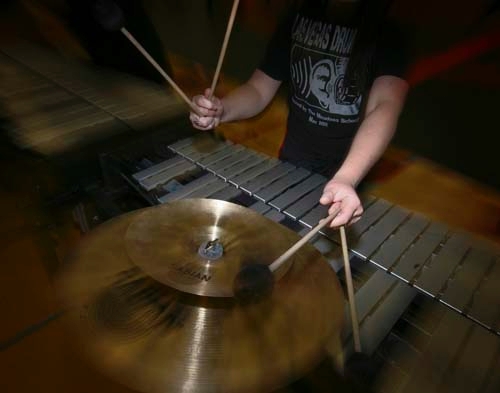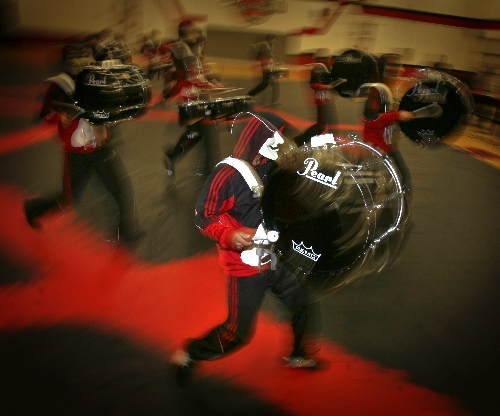‘Anarchy’ show lets drumline rebels stand out with precision
Coach Brian Howerton's clothes quake against his skin, stirred by a dozen drums pounded in perfect unison.
But that's not enough.
STOP.
He slaps two drumsticks together.
He nitpicks every twitch of his drummers' legs, the point of their toes and the twist of their heads. Only two practices remain to get it right before heading to the Percussion World Championships later this week in Dayton, Ohio . And drumming is only the beginning of what Vegas Vanguard Percussion has to do with split-second precision during competition.
"Energy at all points," Howerton directs. "Hit your dots."
AGAIN.
The drummers practice the same 10-second segment over and over while wearing Guy Fawkes masks and black hoodies. They sweep across the stage like a flight of swallows in the air. Fifty pounds of instrument are strapped to their stomachs, making drumming a musical sport that requires disciplined physical training.
Even the drummers' heads become props because of the eerie masks, which have to snap in the same direction at the same time.
In front, five masked figures stand behind a bank of vibraphones, banging their mallets against the keys. Two others control the contorted, digital sounds of synthesizers. Another is surrounded by a rack of drums, cowbells and gongs.
"It has become, 'What can I do while I march and drum?' " assistant coach John Speas shouts in the background.
He is barely audible over the team of 20 local high school and college students practicing their six-minute drumline routine for the 500th hour this season at a University of Nevada, Las Vegas gym.
The closest thing to this sport is marching band, says Howerton, who created Vegas Vanguard Percussion eight years ago.
Before that, he was a high school marching band coach for 15 years.
Their dark, ominous show is called "Anarchy," which is fitting, says Las Vegas High School senior Marcus Kline during a break, sweat beading on his forehead as he stands by his percussion rack.
"It rebels against everything," says Kline, who has been a drummer in the "everything" he's referencing -- high school jazz band, ensemble and marching band.
In marching band, the whole point is for everyone to be the same from their height to their builds, blank facial expressions and military-like marching.
"What we call cookie-cutter," Howerton says.
"You look like a form rather than an individual," drummer and Durango High School senior Jorden Berry said.
Percussion teams strive for unison while retaining individuality.
"You'll never see the same thing twice," Howerton says, describing how world-class drumline teams will front flip and crash into cymbals.
His team, having been to the world championships only once, competes in the beginner class, but placed third in their first showing last year.
"We coaches expect perfection at every point," Howerton says. "But they anarchy us sometimes."
Bass drummer Abraham Reza learned music in marching band. But the 21-year-old College of Southern Nevada student switched to Vegas Vanguard.
"It allows me to be myself," he says.
There's theater in their performance, thought provocation.
The routine starts with the synthesizer playing an aggressive, deep voice. A masked drummer makes hand gestures, as if he's speaking, inside a circle of kneeling drummers.
"We are the anonymous. It's time to wake up, America. We're not living in the land of the free. ... "
They all rise up and spin as one across the stage while drumming in an ascending but harsh, halting beat.
Howerton said the point of "Anarchy" is for people to question their beliefs, not push a perspective.
But it will fall flat if the crowd notices any drummer behind in their beat or moves. That's why the team of drummers, ages 14 to 22, practice from 3 p.m. to 7 p.m. on Wednesdays, and 9 a.m. to 7 p.m. on Saturdays.
That doesn't include core strength training workouts and running during the week or the section practices among each drumming group.
But participation isn't a struggle. Unlike school bands, they all want to be there and pay $1,600 to do so.
"It's like a big, happy family," Berry says, mentioning that when a bass drummer couldn't afford the cost, everyone else chipped in.
Ultimately, it's all for six minutes onstage.
To perform at the world championships, it's worth it. Medal or not.
"Last year, I couldn't even see the people on the top row they were so far back," Berry recalls. "It's huge."
Contact reporter Trevon Milliard at tmilliard@reviewjournal.com or 702-383-0279.
























